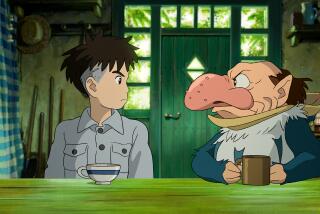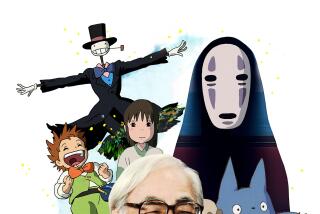‘Next Karate Kid’: Mixed Messages Are at Hand--and Afoot
- Share via
In “The Next Karate Kid,” the wise martial - arts expert Mr. Miyagi becomes temporary guardian for an angry, belligerent teen-age orphan and teaches her discipline, spirituality and a sure-fire way to stop sexual harassment. (Rated PG-13)
*
Whenever adults worry about the messages movies are sending to kids, kids typically like to respond, “It’s just a movie!”
In the didactic Karate Kid series (this is the fourth and the first to feature a girl student), the messages are fast and furious--as painful and obvious as a frying pan to the head and as subtle and moving as a Japanese rock garden. With the extra added twist of a pretty young woman learning to kick butt, er, excuse me, defend herself, the messages are still fast and furious, but also contradictory and confusing.
Let’s see. Julie’s personality is about as appealing as battery acid, and yet she attracts both the polite, principled jock Eric and the evil, nasty jock Ned, who tries to blackmail her into a date down at the docks.
Mr. Miyagi teaches her to not only sense danger in the dark and execute a superior roundhouse kick, but also buys her a low-cut prom dress that turns Eric into a mindless noodle.
Japanese Americans are portrayed as both patriotic victims of injustice during World War II and as cute spiritualists who use Zen to win at bowling. Miyagi, wiser by far than most mortals, still speaks only pidgin English.
In the ultimate mixed message, Julie learns to revere the life of a cockroach at a Buddhist monastery but is later urged to pummel Ned after he has wiped the dock with Eric. “Fighting not good,” Miyagi tells Julie. “But if must fight, win.”
High school teachers, of course, are either stupid or sadistic to the point of encouraging manslaughter.
But, hey, it’s just a movie.
Nine-year-olds Timothy Clancy and Chris Gilbert said they liked what they took as the film’s anti-sexist message. Neither knew much about karate but said it was a good lesson to show a girl standing up for herself and vanquishing bullies by herself.
“I bet boys thought she’d lose,” Timothy said. “It was good to show boys that boys aren’t always better than girls.”
Agreed Chris: “So they won’t be prejudiced.”
But Lauren O’Grady, 12, thought this sequel was inferior to the others, even though it featured a girl. She wanted more realism.
“You could tell the fighting was really fake,” she said.
Other parts struck her as unlikely. For instance, she didn’t think anyone could really keep a wild bird, as Julie did, as a pet in a pigeon cage on top of the school. Nor did she think a girl would be as sexually harassed as she was by the boys at school.
She suggested younger kids might like it better than she did.
But her friend Katharine Shiota, 12, gave it a thumbs up. She liked what she saw as the family messages: that Julie overcame her bitterness over the loss of her beloved parents and learned how to go on with life even though it is sometimes unfair.
To her, the movie was realistic. “All the problems could really happen,” she said.
Except she didn’t think a high school coach would lead a Nazi-like group of law-and-order jocks and encourage them to violence.
“I don’t think a teacher would be that mean,” she said.
Katharine liked the familiar formula of the Karate Kid movies. “They’re funny, and they always have a lesson.”
And if you can’t figure out what it is exactly, well, maybe it’s just a movie after all.
More to Read
Only good movies
Get the Indie Focus newsletter, Mark Olsen's weekly guide to the world of cinema.
You may occasionally receive promotional content from the Los Angeles Times.










